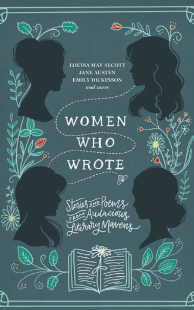
Jerk Magazine
The Collected Poems of Emily Dickinson
March 1 marked the start of Women’s History Month, so what better way of celebrating than highlighting a unique elective at Taft, Women in Literature! The class came to be two years ago and has been taught by Language and Literature teacher Emma Levine.
Levine described the Women in Literature class as looking as, “A variety of texts through a feminist critical lens, which just means thinking about how texts portray femininity as well as women and patriarchy and whether or not these [texts] are aligning with stereotypes about gender… and what that says about our own perceptions about women.”
Levine explained she had the opportunity to create the curriculum on her own, since it is an elective compared to core Language and Literature classes at Taft. She talked about the importance of her student’s voices. “‘If you guys want to do it, I’m down,’ so there’s a lot of student voice that I take into account,” she said.
The 3rd and 6th period classes are able to change their perspective on gender and the patriarchy by looking through this lens Levine explained. Taft senior Gabriella Panzica talked about how much her knowledge has expanded from the start of the year to now.
“Being in the class has definitely opened me up to more literature,” she said. “I like it more than I expected… I really love the class and knew I was going to love it for the rest of the year.”
Taft senior Alexis Espinoza-Barillas was just as intrigued in the elective. Barillas had Levine as a teacher for her sophomore year. “[Levine] has a lot of strong opinions, and I agree with most of them. The books we’re reading are ones that I enjoy. She’s advocating a lot for the class, and inspires me,” she said.
Currently, the Women in Literature classes are reading The Bell Jar by Sylvia Plath, a novel about a girl named Esther who dreams of becoming a poet, while also covering sensitive topics. Panzica and Barilla both expressed they’re enjoying the read. “How we talk about [the book] opens up perspectives,” said Barillas.
Class discussions are always present in the Women in Literature class. Panzica agreed, “We’ve had class periods where we literally don’t get to the lesson, we just talk. It’s like a huge socratic seminar. We enjoy having the discussions… People love talking in that class, just about the thing we’re learning!”
Levine is hoping that enough students sign up for Women in Literature 2025-2026 school year. Levine described the benefits of the class from a teacher’s perspective. “I think it helps students apply the skills you’d use in an English class more authentically. Students are able to notice things in their everyday lives and the media they consume,” she said.
From the supportive environment to just taking time to relax and discuss with classmates, Panzica and Barillas only had positive things to say about signing up for Women in Literature. According to the students, there is a lot of variety that comes with the curriculum, and it’s not difficult at all.
Everybody has a woman in their life that inspires them. Family members, celebrities, athletes, the list goes on. Women in Literature is the class to take if you love to read and write, while also looking through an empowering lens. Women in Literature looks forward to another year, welcoming everyone from any background to learn more about gender.